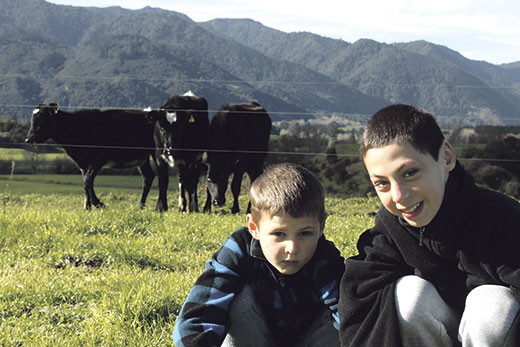Regan and Lee McLeod are sharemilking – not with a farm owner – but with their calves.
The couple, who milk 180 cows on 100 hectares near Te Aroha, leave replacement calves with their mothers – and the benefits far outweigh any temporary loss in milk production.
“People think it’s too hard to manage cows and calves in the shed but it’s not,” says Lee.
“The calves come to the shed with their mothers and gather together to wait outside until the cows are milked, before going back to the paddock with them.
“We do obviously have a drop in milk production while the calves are on their mothers, but those heifers are so much healthier and better producers when they join the herd that it’s worth it,” says Regan, who also believes the mothers benefit too.
“People don’t think cows suffer when they have their calves taken away, but they do. They often sulk and that’s understandable as they are programmed to reproduce and raise a calf.
“I think those that are feeding calves are driven to eat more to produce more milk so their production doesn’t drop as much as you would think.”
Regan, who grew up in the city, says the couple’s current style of farming is radically different from that which he experienced as a young farm hand.
High input
“I was working on a high input farm and loving it. I spent almost all of my time on the tractor feeding out and I thought this was what dairying was all about.”
That began to change when Regan became a sharemilker for another farmer, who was interested in less-intensive, more biologically-friendly farming methods.
It was through this role Regan and Lee, who comes from a farming family, met Phyllis Tichinin of True Health, who was among the farm’s consultants.
“Phyllis opened our eyes to different ways of doing things for the health of our cows and our family,” says Lee. Phyllis has become a friend as well as a valued farm consultant, helping to advise the couple on farm management decisions.
Certified organic
Regan wanted to experiment further with unconventional farming methods so the couple decided to lease the farm they are currently on four years ago. Today, the farm and the herd are certified organic and supply milk to Green Valley Pure Milk through the Organic Dairy Hub.
“We were going broke at conventional milk prices and I know a lot of other farmers are struggling,” says Regan. “If we hadn’t switched to organics we would have had to leave the industry, but that was something we didn’t want.”
Organic farming has done more than boost the bank balance and remove income worries – it’s also relieved a whole lot of other stresses, including those around animal health.
“Animal health used to cost us up to $12,000 a year, but now our vet bill is very, very low and we don’t need to use antibiotics.”
Being free to experiment with different farming techniques is something Regan enjoys and he bases many of his practices on observations of animal behaviour and the need, as a one-couple farming operation, to keep things simple.
Cows choose
“Cows need a range of nutrients but not all in the herd have the same requirements so I let the cows choose what they want by taking into the paddock a trailer with buckets of different minerals and trace elements and letting the cows sample what they want.
“They even eat copper sulphate because when they put their heads in a bucket to check it out, they lick what gets on their noses.”
Regan also rubs calcium over newborn calves, knowing the mothers will absorb that when they lick their offspring.
He’s changed calving time from winter to September-October. “About 50 per cent of this property floods in winter, but we have great summer growth so I figured why have cows calving in the coldest, wettest, hardest part of the year as farmers have done for generations?
“Calving in spring is a pleasure – I’m usually out there in shorts and T-shirt. It’s better for the cows and calves and it’s when we get a premium for the milk too.”
Herbal ley
The McLeods have also experimented with pasture, growing a herbal ley, and this season are considering planting fodder beet and possibly sunflowers as supplementary feeds.
Their current herd is a mix of Jersey and Jersey-cross but Lee and Regan are keen to transition to a full Jersey herd and have just invested in a top-performing Jersey bull.
The McLeod’s unconventional farming techniques sometimes attract criticism from within the industry. But they are not about to let that deter them from following techniques that have enhanced the health and wellbeing of their animals, the land, themselves and their family. Plus, they take satisfaction in producing high quality organic milk which is also good for their customers.



0 Comments
Leave a Comment